BY EDWIN PEARS, LL.B.
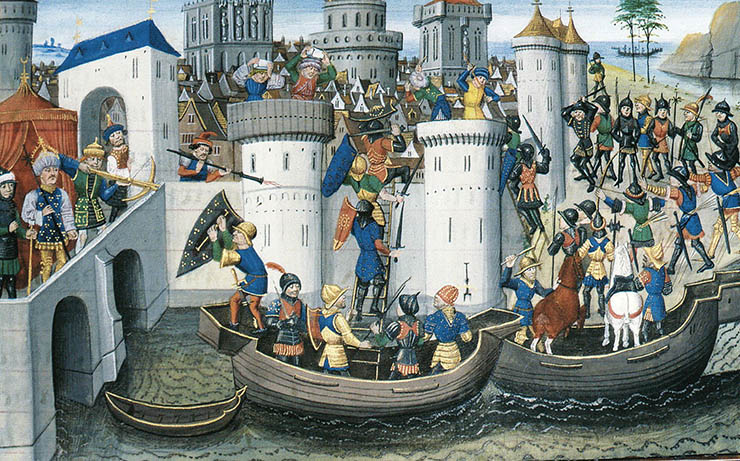 The later Roman Empire and its capital Constantinople never recovered from the blow inflicted by the Fourth Crusade in 1204. A huge filibustering expedition had been gathered together at Venice under pretext of making an attack upon the Saracens in Egypt. Under the leadership of Boniface, Marquis of Montferrat, and Dandolo, the famous doge of Venice, the expedition had been diverted from its purpose, and, in spite of the strongest possible protests by Innocent the Third, had attacked Constantinople. The strength of the empire had been weakened by a hundred and fifty years’ resistance to the hordes of Asia, during which it had served as the bulwark of Europe. Its reputation had been lessened by thirty years of dynastic wars, during which the government had allowed its fleet to decay so that it was unable to resist the Venetians and Crusaders. The result was that, for the first time in its long history, the city was captured. There then followed the plunder and division of its enormous wealth—a large part of which found its way to the West, while perhaps a still larger portion was destroyed—the appointment of a Latin emperor in Constantinople, and the partition of such portions of the empire as could be occupied among the conquerors.
The later Roman Empire and its capital Constantinople never recovered from the blow inflicted by the Fourth Crusade in 1204. A huge filibustering expedition had been gathered together at Venice under pretext of making an attack upon the Saracens in Egypt. Under the leadership of Boniface, Marquis of Montferrat, and Dandolo, the famous doge of Venice, the expedition had been diverted from its purpose, and, in spite of the strongest possible protests by Innocent the Third, had attacked Constantinople. The strength of the empire had been weakened by a hundred and fifty years’ resistance to the hordes of Asia, during which it had served as the bulwark of Europe. Its reputation had been lessened by thirty years of dynastic wars, during which the government had allowed its fleet to decay so that it was unable to resist the Venetians and Crusaders. The result was that, for the first time in its long history, the city was captured. There then followed the plunder and division of its enormous wealth—a large part of which found its way to the West, while perhaps a still larger portion was destroyed—the appointment of a Latin emperor in Constantinople, and the partition of such portions of the empire as could be occupied among the conquerors.
Baldwin, 1204–1205.
Baldwin, a Belgian, was elected emperor. An arrangement for the division of the spoil had been made by the leaders before the attack on the city, and this seems to have been fairly carried out. To Baldwin were assigned the two imperial palaces in Constantinople and one fourth of all that should be captured within the city and throughout the empire. The remaining three fourths were to be divided equally between the Crusaders and the Venetians. The difficulties of the conquerors began with this further division of the spoil. The task of parcelling out the empire was almost hopeless.Difficulties regarding division of empire. It was next to impossible to accomplish such a partition, even on paper, because of the ignorance of the Western conquerors of the empire they had destroyed. Its extent was so great, the difficulty of communication so extreme, and ignorance of geography so profound, that the conquerors did not know what there was to divide. They sent into the provinces to obtain information as to the revenues and general condition of the country so that the partition might be fairly made; but, without waiting for the information, they proceeded to divide up the countries and provinces which they imagined to be within the empire. In their happy ignorance they drew lots for Alexandria and for the various countries along the north shore of the Mediterranean as well as for Georgia, Persia, and Assyria. They competed for the possession of Konia itself, the capital of the Seljukian Turks.
It was still more difficult to make a partition which should represent territory which could come at once into the occupation of the Crusaders. The one system of land tenure with which they were acquainted was the feudal. The lands of the empire must therefore be divided into fiefs and the barons and persons of higher and of lower degree must have grants according to their rank. But though Constantinople was in the possession of the men of the West, they held no more of the remainder of the empire3 than was within the actual sight of the barons and the comparatively small bodies of retainers who were under them. The Greeks—or, as the subjects of the later empire still generally called themselves, the Romans—had no intention of recognising either the lordship of the barons who had become their feudal superiors or the overlordship of Baldwin. They knew nothing of a feudal system, and recognised the representatives of the late empire as having a first claim to their service. They were ready to follow almost any leader against men whom they knew only as invaders, belonging to a different race, speaking a different language, and professing a form of Christianity which was hateful to them because the conquerors tried to impose it upon them.
The difficulties of the Latin empire were both internal and external.
Dissensions among leaders.
The men from the West soon found that they were too few to hold the country. Some of the Crusaders had insisted upon leaving the city in order to proceed to the Holy Land in fulfilment of their vows and to avoid the censure of Innocent. Others were anxious to return home with their share of the spoils. ‘Never since the world was created,’ says Villehardouin the historian, who took an active part in the capture of the city, ‘was there so much booty gained in one city. Each man took the house which pleased him, and there were enough for all. Those who were poor found themselves suddenly rich.’ If they remained they had hardships to face which as the possessors of newly obtained wealth they would rather avoid. As soon as new dangers appeared the numbers of those who wished to get away increased. During the very first year of Baldwin’s reign, his army on its retreat from an expedition against the Bulgarians found at Rodosto seven thousand men at arms who had quitted the capital and were leaving the country. It was in vain that a cardinal and the leaders sent by the army, among whom was Villehardouin himself, implored them even with tears to remain, for ‘Never,’ said these leaders, ‘would they be able to succour a country in so4 great a need. The most favourable answer that they could obtain was that a reply would be given on the morrow. The deserters set sail in the night without even giving the promised response to the prayer made to them.
The internal difficulties were increased by the jealousy which existed between the leaders of the Latins themselves. All through the journey to Constantinople before the capture of the city, the Crusaders and Venetians had mistrusted each other. Boniface, the leader of the Crusade, considered himself ill treated because he had not been named emperor. Though defeated, he had a large number of adherents. To him had been assigned territory in Asia Minor. He applied to exchange it for the kingdom of Salonica, alleging that as he had married the widow of the Emperor Isaac, who was the sister of the King of Hungary, he would be at Salonica in a better position to aid the emperor. His request was granted. Baldwin, however, did not trust him, and, apparently under the impression that it was the intention of Boniface to establish an independent sovereignty, insisted on accompanying him to his newly acquired capital. To this course Boniface objected so strongly that when the emperor started for Salonica, Boniface not only refused to accompany him but went off towards Adrianople, captured Didymotica, and laid siege to the former city. The Greeks flocked to his standard, possibly being induced to do so by the belief that as he had married the widow of Isaac he was entitled to their allegiance.
As soon as Dandolo, Count Louis, and the other nobles who had remained in Constantinople heard what Marquis Boniface was doing, they at once took counsel in ‘parlement’ as to the measures to be adopted: ‘for,’ says Villehardouin, ‘they thought that they would lose all the conquests they had made.’ They decided to send a knight to Boniface without delay, and the historian was himself chosen for the mission. He went at once to Adrianople and succeeded in persuading the marquis to submit the questions between him and the emperor to the arbitration of Dandolo and Count Louis, and for the present to cease hostilities. Meantime the emperor had occupied Salonica. As soon as he heard of the siege of Adrianople he at once hastened to its relief and ‘pour faire tout le mal qu’il pourrait au marquis.’ On the way he met the messengers from the city, who besought him to submit his case, as Boniface had consented to do, to arbitration, at the same time plainly telling him that Dandolo, Count Louis of Blois, and the other barons would not tolerate war between him and Boniface. The emperor hesitated and consulted his council. Some of the members urged that the message was an outrage and advised resistance. Violent language (‘grosses paroles’) was used, but the emperor, who was unwilling to risk the hostility of so strong a combination as Dandolo and Louis, gave way to the extent of stating that he would undertake not to attack Boniface until he went to Constantinople, although he would not pledge himself to refer the questions between them to arbitration. Shortly after, when a peace was patched up between them, it was under conditions which show that neither party trusted the other. Villehardouin undertook to hold Didymotica until he knew by a trusted messenger that Salonica had been handed over to Boniface.
Nor were the external differences which at once presented themselves less serious. The history of Constantinople and the Latin empire during the period between 1204 and 1260 is indeed that of a series of struggles between Baldwin and his successors on the imperial throne, on the one side, and the leaders of the Greek race who had refused to recognise the authority of the invaders, on the other.
Opposition of Greek population.
The Western barons seemed to have thought that with the conquest of the capital the whole empire would fall to their lot. They were soon undeceived. In Macedonia and in Epirus Greek leaders appeared, who rallied to them all who were indisposed to accept new rulers. At Trebizond on the Black Sea, and at Nicaea, the once famous city of the Creed, the Greeks flocked from the capital and its neighbourhood, and soon there were rulers of these cities who assumed the title of emperor.
Empire of Nicaea. Theodore Lascaris, 1204–1222.
The most important of those who refused to accept the Latin rule was Theodore Lascaris. He had been the last of the Greek nobles to leave the city when the invaders captured it. He made his way to Nicaea, and was followed by many Greeks. Able, courageous, and patriotic, he was soon recognised by the notables as the fittest man to have rule among them, and, though without hereditary claim to the imperial throne, he aspired to be emperor and was accepted as best suited to receive that dignity. Two years after the capture of Constantinople, a new patriarch was elected, who consented to live at Nicaea and who amid as much ceremony as if the coronation had taken place in St. Sophia placed the crown on the head of Theodore in the church of the same name at Nicaea. The prudence and judgment of the new emperor did much to rally the best of his countrymen around him, and justified the choice made in electing him to the imperial throne. The Greek priests flocked to the city from all parts of Western Asia Minor as well as from Thrace.
Nevertheless, his task was beset with difficulties. He had enemies on all sides, pretenders of his own race, the Latin emperor and the sultan of the Seljukian Turks. The latter, whose capital was at Konia, had no idea of allowing any neighbour to become formidable. A Greek pretender held the country to the west of Nicaea. The Latin emperor and barons chose to regard Theodore as a rebel because he would not make submission. After unsuccessful attempts against him by Baldwin and his successor, Theodore was allowed in 1207 to remain in possession of Ismidt (the ancient Nicomedia) and Cyzicus for a period of two years. He employed the period in strengthening and extending his empire. At the end of it, Henry the brother of Baldwin, whom he succeeded as emperor, made an alliance with the sultan of the Seljukian Turks: that is to say, the Crusaders who had justified themselves to Innocent the Third for attacking a Christian city on the ground that the Greek emperors had allowed the Moslems to have a mosque within the city, now found themselves under the necessity of joining forces with the infidel to attack a Christian prince.
Upon the declaration of war by the sultan, Theodore pushed forward into the valley of the Meander, and a battle was fought which, if the Byzantine authorities are to be trusted, was decided in single combat between the two sovereigns. The sultan was killed, and the empire of Nicaea was saved. The Emperor Henry, however, when he heard of the extent of the loss in Theodore’s army exclaimed, ‘The Greek is not conqueror: he is ruined.’
So far from being ruined, his success caused many Greeks to flock into his empire from Constantinople. When, in 1214, the Emperor Henry again declared war, Theodore was ready for him; and as the Greeks in Epirus had commenced a vigorous attack on the crusading barons in Macedonia, Henry was glad to make a peace which left Theodore undisputed master of a territory bounded on the west by a line from Heraclea on the Black Sea to Ismidt, thence to Cyzicus and to the coast just north of Pergamos. The fruitful valleys of the Meander, the Cayster, and the Hermus marked his boundaries on the south-west.
Theodore died in 1222. The first duty of the Greeks when driven out of Constantinople was to make themselves secure against the conquerors and to prevent the progress of the crusading armies into Asia Minor. This duty had been effectually done by Theodore. During the eighteen years of his reign he had made his capital and its beautiful neighbourhood the rallying-place of what was best in the Greek-speaking populations of Asia Minor and of Thrace. He had checked the progress of the crusaders into Asia Minor and had left to his successors the task of working for the recovery of Constantinople.
Henry succeeds Baldwin, 1205–1216.
Meantime, the history of the Latin conquerors of Constantinople had been one of almost continuous disaster. The first Emperor Baldwin had been lost in an encounter with the Bulgarians near Adrianople in April 1205, and was probably killed. As his fate remained doubtful, his8 brother Henry acted as regent for a year and was then crowned emperor. Shortly after the commencement of his reign in 1207, Boniface, Marquis of Montferrat and King of Salonica, was killed in a skirmish. Henry seems to have realised that in a policy of conciliation towards the Greeks lay the only hope of the continuance of his empire. He made peace with the Bulgarians and concluded an arrangement with both the emperor of Nicaea and the Greek prince who had made himself recognised as despot in Epirus. He employed Greeks in the public service. He refused to take part in the persecution of the Greeks who would not obey the decrees of the pope’s legate. He allowed them to employ the Greek language in their services, and restrained the pretensions of the Roman priests. Unfortunately for the Latin empire, the reign of the chivalrous Henry lasted only ten years.
Peter succeeds, 1217–1219.
He was succeeded by Peter of Courtenay, who was invited by the barons to occupy the throne in the absence of male heirs of Baldwin and his brother Henry. Peter left France with 140 knights and 5,500 men at arms, whom he had obtained with the aid of his royal kinsman, Philip Augustus. The reports of the rich plunder which had been obtained in the capture of the city had already induced many French knights to leave their native lands to take service in the empire, but the detachment with which Peter crossed the Alps was the largest which had left the West for such purpose.
The Venetians bargained to transport them across the Adriatic on condition that they would assist in recovering Durazzo from Theodore, the Greek despot of Epirus. After a useless assault on that city, Peter started with his followers on a journey across the peninsula to Salonica. He and his host were soon lost amid the mountains of Epirus. Their provisions were exhausted. They found the passes fortified, and their only chance of life was to surrender to Theodore, who had held the country in defiance of the regent who was governing in the name of the son of Boniface. Peter was detained in captivity, and his death is as mysterious as that9 of the first Latin emperor. He probably perished in prison in 1218.
Robert, 1219–1228.
Peter’s successor, Robert of Courtenay, succeeded in finding his way to Constantinople, though not across Macedonia, accompanied by a number of troops furnished at the request of Pope Honorius the Third. His reign was a series of disasters. He made a treaty of peace with Theodore of Nicaea in order that he might devote all his attention to the defeat of the other Theodore, the despot of Epirus. The latter had been denounced by the pope for his detention of Peter and of the legate who accompanied him. Honorius indeed had invited the princes of the West to undertake a crusade for their deliverance. When, however, the legate was released, Peter seems to have been forgotten. The despot Theodore made a well-concerted attack upon Salonica, captured it, and was proclaimed emperor in 1222. Robert led all his forces against this new claimant for the imperial title and was badly beaten. Theodore pushed on to Adrianople and hoisted his standard on the walls of that city almost without opposition.
There were thus in 1222 four persons claiming to be emperors, and occupying separate portions of what had been twenty years earlier the Roman Empire in the East. These were Robert at Constantinople, Theodore at Nicaea, another Theodore at Salonica, and Alexis at Trebizond.
Nicaea, success of John Ducas Vataces, 1222–1254.
The history of the next forty years (1222–1261) is that of the strengthening of the Greek empire at Nicaea and the decadence and downfall of the other so-called empires, and especially of that of the Latin Crusaders in Constantinople. The successor of Theodore Lascaris was John Ducas Vataces, who during a reign of thirty-three years fortified his position at Nicaea and increased the prosperity of his empire. He restricted the boundaries of the Latin territory in Asia Minor to the peninsula formed by a line parallel to the Bosporus from Ismidt to the Black Sea. He rendered property and life safe, and in consequence the Greek population continued to flock into his territory. Even French soldiers in considerable numbers quietly slipped away from10 Constantinople to take service with Vataces. At the commencement of his reign he was attacked by the newly appointed emperor, Robert of Courtenay, and in the combat which ensued not only was Vataces successful, but the last of the knights who had taken part in the capture of the city were left dead on the field. Until Robert’s death in 1228, Nicaea had few troubles with the Latin empire.
Latin empire. John of Brienne, 1228–1237. Baldwin II., 1237–1261.
Robert’s successor was a boy of eleven, who continued nominally emperor under the title of Baldwin the Second for upwards of thirty years, but the Latin knights wisely placed power in the hands of John de Brienne. Indeed, the crusading leaders seem throughout the whole Latin occupation to have assumed a large measure of the imperial authority. The period is contemporary with that of the barons who resisted King John in England, and who continued to assert their independence under the reign of Henry the Third. The French barons in Constantinople had much of the same spirit, with the additional incentive to independence that, as the emperors were of recent creation, the glamour which had already gathered about the kingly office in England and France was absent. The emperor was indeed nothing more than primus inter pares, and his own designs were often set aside for those of his associates. No one can doubt that they acted wisely in appointing John de Brienne, but even he, with all his experience and caution, failed as his predecessor had done when he attacked Nicaea.
The courage and ability of the old Crusader, who was already eighty years of age, hardly retarded the decay of the Latin empire. Its needs were great, and accordingly Baldwin the Second was sent on a visit to the pope and to the Western courts to obtain further supplies of men and money. Indeed, the greater part of his reign was Baldwin visits France, occupied by three of such journeys. His first visit to France was in 1237. Hardly had he arrived in Paris when he learned the death of John de Brienne. The messenger who brought the tidings told a terrible story of the distress in the imperial city. The barons and soldiers15 dared not venture outside the walls. The supply of food had run so short that many of the gentlemen of France who were charged with its defence disguised themselves and escaped by sea or, notwithstanding that the country was full of dangers, endeavoured to make their way by land to their own country. The peril was so great that Baldwin was assured that if aid were not sent the city could not resist an attack. Upon these tidings Baldwin did his utmost to obtain aid. He was received with honour wherever he went, but he received little else. In 1238, he paid a visit to England. On his landing at Dover he was asked and England. how he presumed to enter the country without the permission of its independent sovereign, Henry the Third. Henry had had enough trouble with Crusaders. John de Brienne, who had been in England, had obtained aid from the king and had been honourably received. On his return to France he had joined with Philip Augustus against England. Henry, however, sent word to Baldwin that as he had arrived without troops he might come on to London. After receiving this permission he paid a visit to the king and finally left England with the miserable sum of seven hundred marks.
Pope supports Latin empire.
The pope had taken Baldwin’s cause greatly to heart. He enjoined all Christian princes to give him aid. He ordered the leading archbishops of the West to publish a new Crusade against the Greek schismatics. He directed part of the Peter’s pence to be given for the furtherance of the Crusade and ordered that the money which St. Louis with pious zeal had extorted from the Jews as obtained by usury should be employed for the same purpose. He begged the king to direct that one third of the revenues of the churches should be thus employed, and he wrote to the king of England with a similar request. In 1238 John de Bethune started from France with men and money. The expedition, however, came to grief. Its leader died at Venice and the army melted away, very few ever arriving at the Bosporus.
Decay of Latin empire.
The character of the news from Constantinople continued constantly to be more and more distressing. The revenue was yearly decreasing. The money obtained in Europe was already spent, and the knights were driven to desperate expedients to obtain more. Copper was torn from the domes of the churches and other public buildings to be converted into coin. Empty houses were pulled down to supply fuel. The sacred relics, which in the eyes of the Crusaders constituted not only the most valuable treasures of the city but the talisman of its safety, were sold to meet pressing needs.Sale of relics. The Sacred Crown of Thorns had been pledged for a sum of about seven thousand pounds, and when the time came for redeeming it, the Latins were not able to find the money. A Venetian endeavoured to obtain it in order to add to the prosperity of the Bride of the Seas, but Baldwin, possibly out of gratitude to Saint Louis of France, and with the object of obtaining a larger sum, preferred that it should be sent to France. After considerable difficulty and many negotiations, the sacred relic was redeemed and taken with solemn procession from Venice to Paris, where the king himself, clothed in penitential garments and barefoot, went out to meet it and to accompany it to its temporary resting-place. This was in 1239. Baldwin received from Louis, in recompense of his labour to obtain so valuable a prize, the sum of ten thousand marks.
Nor was this the only relic which the crusading empire was obliged to convert into money. A large portion of the true cross, the lance, the sponge, and other objects, the parting with which must have cost Baldwin and his barons many a regret, were also sent to France in order to raise money.
By July 1239 Baldwin had collected in the West all the money and forces available and started for Constantinople. The number of his army was greatly exaggerated by the rumours which preceded it and greatly alarmed the Greeks at Nicaea. He arrived at Constantinople at the end of Prosperity of Nicene empire. 13 December. John Vataces, in consequence of these rumours and as a precaution, allied himself with the Bulgarians. The armies of the two states attacked Constantinople. The Venetians saved the city by arriving in time to make it necessary to raise the siege. Then the Bulgarians made friends with the Latins and allowed a band of Comans (or Turcomans) who had been driven over the Danube by the Mongols to pass through Bulgaria and take service with the Latins. The emperor of Nicaea could, however, play a similar game, and he induced a band of the same race, who formed excellent light cavalry, to settle on the banks of the Meander and in Phrygia.
John Vataces succeeded, partly by force, partly by persuasion, in inducing the despot of Salonica to abandon the title of emperor and to recognise Nicaea as the true representative of the former empire of Constantine. Vataces thereupon became acknowledged ruler of the kingdom of Salonica from the Aegean to the Adriatic.
Decay of Constantinople.
Meantime the wealth and population of Constantinople were diminishing every day. Its commerce had almost gone. What was left was in the hands of the Venetians. No taxes could be levied on the poverty-stricken population. The Greeks of the country around Constantinople, who had been the food-producers and the source of revenue to the merchants of the capital, fled from the constant harass of war and invasions, now by Latins, now by Bulgarians, and now by Greeks, into Asia Minor, where they could labour in the fields or trade in peace and quietness.
The population in other parts of the country were in like straits. The continual money difficulties among the Latin knights and the Crusaders generally caused a widespread spirit of lawlessness. Necessity compelled them to live on the country they were passing through, and wherever they were under the command of a weak ruler, pillage was common and almost unchecked. Before men thus lawless, poor peasants fled in alarm across the Marmora to be not only among their own people but where life and property were secure.
As illustrating the lawlessness among the Latin nobles, a story told of the Emperor Robert himself is significant. He was engaged to marry the daughter of Vataces, a marriage which promised obvious advantages to the Latin empire. He preferred, however, a lady who was affianced to a knight of Burgundy. Her mother had acquiesced in her throwing over her fiancé in favour of the young emperor. The Burgundian and his friends forced their way into the palace, threw the mother into the sea, and brutally disfigured the face of the girl. The barons approved of the deed, and the king went whining to the pope to condemn the wrong-doers, since he himself was powerless to avenge the insult offered to him.
Under such conditions of lawlessness, capital fled the country. The Latin government had once more to resort to every possible device for raising money, and the ornaments of the churches and other public buildings were sent to the melting-pot or to auction.
While disaster and decay marked the condition of things in Constantinople, Nicaea continued to increase in prosperity. The city itself, in a healthy situation on the beautiful lake of Ascanius, had under the rule of John Vataces already become wealthy. Taxes were light because the revenue was not squandered, and the emperor had carried into the public expenditure the same habits of carefulness which he displayed in the management of his own private estates. It is recorded of him, as an illustration of his thrift, that on presenting the empress with a coronet decked with jewels he explained to her that it had been bought with money exclusively obtained from the sale of eggs produced on his own estates. He paid especial attention to agriculture, and, though distinguished as a warrior, set the example of attending personally to his farm, his flocks and herds, the cultivation of his fields, and the welfare of his labourers. We may excuse his sumptuary laws for the reason that the object was to check the luxury of the nobles and to encourage home manufactures. When he died, in 1254, after a reign of thirty-three years, Nicaea had deservedly obtained15 the reputation of being the chief city of all Greek-speaking people, whether in Europe or in Asia, the city to which the people lifted up their eyes in confidence of a speedy return to the queen city on the shores of the Bosporus.
Theodore II. of Nicaea, 1254–1258.
The reign of Theodore Lascaris the Second, son of John Vataces, lasted only four years, and though he lacked the ability of his father, and was a sufferer from epilepsy, the empire of Nicaea continued to prosper. His military administration was able and successful. He continued the policy of Vataces in endeavouring to induce or to compel all the Greeks in the Balkan peninsula to come under his rule. It may be fairly said of him that on his death, in 1258, the position of Nicaea was stronger than on his accession.
During these two prosperous reigns in the Greek empire that of the Crusaders had continued to go from bad to worse. In spite of the anathemas of the popes against those who should attack Constantinople, the Bulgarians and the Greeks made war upon it whenever they thought the opportunity favourable. In spite of the exhortation of the popes to Western Europe to furnish men and money, and of the fact that both were furnished, the empire grew weaker in men and its financial situation became worse.
We have seen that Baldwin returned to Constantinople with an army which is said to have numbered 30,000 men, and which in any case was sufficiently large to alarm the Nicene emperor. But these reinforcements seem to have been a burden rather than an advantage, and the chief of the crusading empire had to shock Christian Europe by consenting to give his niece in marriage to the sultan of Konia in order to secure an alliance with him against the Greek emperor. Second visit of Baldwin to West.Baldwin’s necessities again compelled him to visit France. He was once more received with honour, and at the Council of Lyons, in 1245, he was given the position of supreme honour, and was placed on the right hand of the pope. All, indeed, that the sovereign pontiff could accomplish in favour of his guest in this Council was done. An alliance which the Emperor Frederick had made with John Vataces was denounced, and the head of the16 Holy Roman Empire was solemnly excommunicated. While nothing was said about the alliance with the Seljukian Turk, Frederick was condemned for allowing his daughter to be married to a schismatic Greek. Large sums were ordered to be contributed by the dignitaries of the Church and by the religious orders for the succour of the empire. St. Louis again gave Baldwin a welcome, and entertained him at his court during nearly two years while aid was being collected. The pope gave power to absolve from sins those who should join the Crusade or contribute to the support of the empire. But, as Matthew Paris says, his empire nevertheless daily decayed. It was not till 1248 that Baldwin returned to his impoverished capital. Perhaps the lowest depth of degradation was attained by him when in 1259 his necessity was so great that he was obliged to put his only son in pledge to certain Venetian nobles as security for the payment of what he had borrowed. The unfortunate lad was taken to Venice, and his father was unable to redeem him until after the recapture of Constantinople.
Before the death, in 1258, of Theodore Lascaris the Second, the ruler of Nicaea was acknowledged emperor, not merely throughout the northern part of Asia Minor, but in the kingdom of Macedonia, and even in a considerable portion of Thrace.John Ducas Emperor of Nicaea, 1258–1260. His successor, John, was a boy. John’s guardian was Michael Palaeologus, who was proclaimed emperor in January 1259–60. Seeing that there was some disorder in Nicaea, occasioned by the disputes between those in favour of the boy, who, in the ordinary course of succession, would have been emperor, and those who had recognised that the times were too critical to allow him to reign, and had Michael Palaeologus.consequently followed Michael, the Latin emperor, Baldwin, judged the moment opportune to stipulate for concessions. Accordingly he sent a mission to Nicaea to learn what Michael would give in order to avoid war. The historian Acropolitas, who was at Nicaea at the time, records what passed. The emperor mocked the ambassadors. They asked that he should surrender Salonica. The reply was that that city was the emperor’s birthplace; how could he17 part with it? They suggested Seres. The emperor responded that what they were asking was neither just nor decent, since he had received it from his father. ‘Give us, then, Bolero.’ But that was the emperor’s hunting-ground, and could not be spared. ‘What, then, will you give us?’ ‘Nothing whatever,’ replied the emperor. ‘But if you want peace with me, it is well, because you know me, and that I can fight. Pay me part of the tribute collected at Constantinople, and we shall be at peace.’ No better terms were to be had, and the ambassadors left.
Michael probably understood that his refusal would be followed by war. He therefore visited the fortifications already gained in Thrace by the Greeks, strengthened them, and within a few months the Latin empire was reduced to the occupation of Constantinople and a small strip around it. In the following year, 1260, Michael’s general, Strategopulus, was entrusted with the command in Thrace. He stormed Selymbria (the modern Silivria), and tried but failed to capture Galata, which was already in the occupation of the Genoese. Thereupon a truce was made for one year.
Seeing that the Venetians, whose great power in the Levant dates from the fall of Constantinople in 1204, in which they had played so important a part, still maintained their connection with the empire on the Bosporus and, indeed, continued to be the principal source of such strength as it possessed, Michael, to the great indignation of the pope and the West, made an alliance with their rivals, the Genoese, an alliance which was the foundation of their supremacy in trade in the Black Sea.
Capture of Constantinople by the Greeks.
It is not impossible that Strategopulus had been sent into Thrace in 1260 rather to form a judgment of the chances of capturing the city than of making war. It is quite possible, as suggested even by Pachymer, that the attempt on Galata was a mere feint in order that he might get into communication with friends in the capital. In consenting to give a year’s truce, however, Michael seems to have been sincere. Accordingly, when, in 1261, he again sent18 Strategopulus into Thrace it was with instructions that he was not to attack the city. He had with him only 800 men, but as he passed through the country behind Constantinople the Greek settlers (Volunteers, as they are called, (Θεληματάριοι), who had friends in the city, flocked to him, and urged that he would never have a better chance of capturing it than at that time. The last detachment of troops which had come from France had left the city, with the Venetian fleet, upon an expedition into the Black Sea to capture Daphnusia. Constantinople might be surprised in their absence. In spite of the imperial orders, the chance was too good to be missed. He brought his men to the neighbourhood of the capital, and hid them near the Holy Well of Baloukli, situated at about half a mile from the Gate of the Fountain,17 one of the important entrances into the city through the landward walls. His volunteers had not deceived him when they stated that they had friends in the city. Probably every Greek was a secret sympathiser.
George Acropolitas, who died in 1282, and whose account, therefore, must have been written while the events were fresh in his memory, gives the most trustworthy version of what happened. He says: ‘But as Strategopulus had some men near him who had come from the city and were well acquainted with all that had passed there, from whom he learned that there was a hole in the walls of the city through which an armed man could easily pass, he lost no time and set to work. A man passed through this hole; another followed, then others, until fifteen, and perhaps more, had got into the city. But, as they found a man on the walls on guard, some of them mounted the wall and, taking him by the feet, threw him over. Others having axes in their hands broke the locks and bolts of the gates, and thus rendered the entry easy for the army. This is how the Cæsar Strategopulus, and all the men he had with him, Romans and Scythians (for his army was composed of these 19two peoples), made their entry into the city.’18 Probably there were few inhabitants in that quarter, and the advance to the principal part of the city might be made in the dark. At dawn the invaders pushed on boldly, met with a brave resistance from a few—a resistance which they soon overcame—and the rest of the French19 defenders were seized with panic and fled. While the city was thus passing once more into the hands of the Greeks, the French and Venetian ships were coming straggling down the Bosporus, on their return from Daphnusia, which they had failed to capture. Accordingly, the army of Strategopulus and his volunteers set fire to the dwellings in the French and Venetian quarters in the city and to their villas on the European shore of the Bosporus near Galata. While the foreigners were occupied in saving their own property and their women and children from the fire, Strategopulus strengthened his position in the city.
Flight of Baldwin II.
The weak and incapable Baldwin was at the palace of Blachern when the Greeks entered the city. Afraid to pass through the streets where the fighting was going on, he entered a boat, made his way down the Golden Horn, and took refuge among other fugitives with the Venetian fleet.
End of Latin empire.
His flight was on July 25, 1261, and with it ends the history of the Latin empire in Constantinople. It had been established by perjured Crusaders and filibustering Venetians who were justly anathematised by Innocent the 20Third. It had always been a sickly plant in a foreign and uncongenial soil, and, though popes and kings had made quite remarkable exertions to make it grow, it never even gave a sign of taking root. The empire had succeeded, as Innocent predicted that it would, in making the Greeks loathe the members of the Latin Church like dogs, and in rendering the union of the two Churches impossible. The Crusaders, as Innocent had likewise foretold, had seized an empire which they could not defend.20 Their expedition had broken up the great machine of Roman government which had been working steadily and, in the main, well for nearly a thousand years. It had done irreparable mischief unaccompanied by any compensatory good. In the course of two generations, the barons who had taken part in the capture had died, and though among those who, at the bidding of successive popes and of St. Louis, replaced them there must have been many actuated by worthy motives, none among them have left any evidence whatever of statesmanship or of those qualities which have enabled nations to conciliate or to assimilate the people whom they have conquered. In sixty years the peasants might have become content to acknowledge a change of rulers had they been allowed to till their fields in peace: the traders might have forgotten the hostility of their fathers if they had been permitted to exercise their industry in security; but the continued and ever increasing exactions of their masters forbade them to forget that they were under alien rulers. All that were worthy in the city had sought refuge elsewhere: the priests, the students with their priceless manuscripts, and the traders had escaped to Nicaea or to Trebizond. The oppressors had seen themselves deserted and the limits of the empire restricted almost to the boundaries of the city. The Latin empire, which had never been formidable, had become an object of contempt. When, however, its last emperor slunk away as a fugitive from his imperial city, he was hardly more contemptible than when 21he was present as a mendicant at the court of St. Louis or of Henry the Third. His empire deserves only to be remembered as a gigantic failure, a check to the progress of European civilisation, a mischievous episode, an abortion among states, born in sin, shapen in iniquity, and dying amid ignominy.
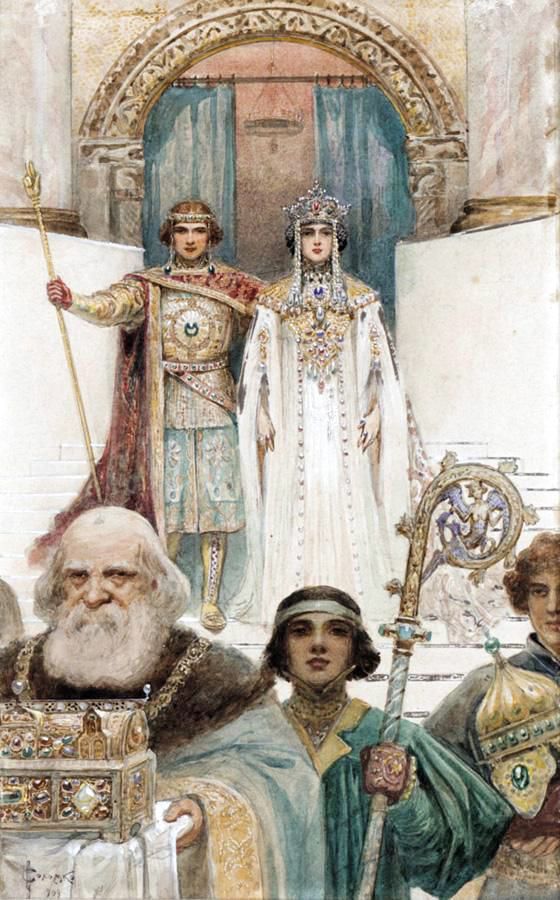 The last chariot race in Constantinople was in the huge courtyard of the Blachernae palaces for the wedding of a prince of the Angelid Dynasty in 1200. The wedding cost a fortune and the people had to pay a special tax to cover the cost.
The last chariot race in Constantinople was in the huge courtyard of the Blachernae palaces for the wedding of a prince of the Angelid Dynasty in 1200. The wedding cost a fortune and the people had to pay a special tax to cover the cost.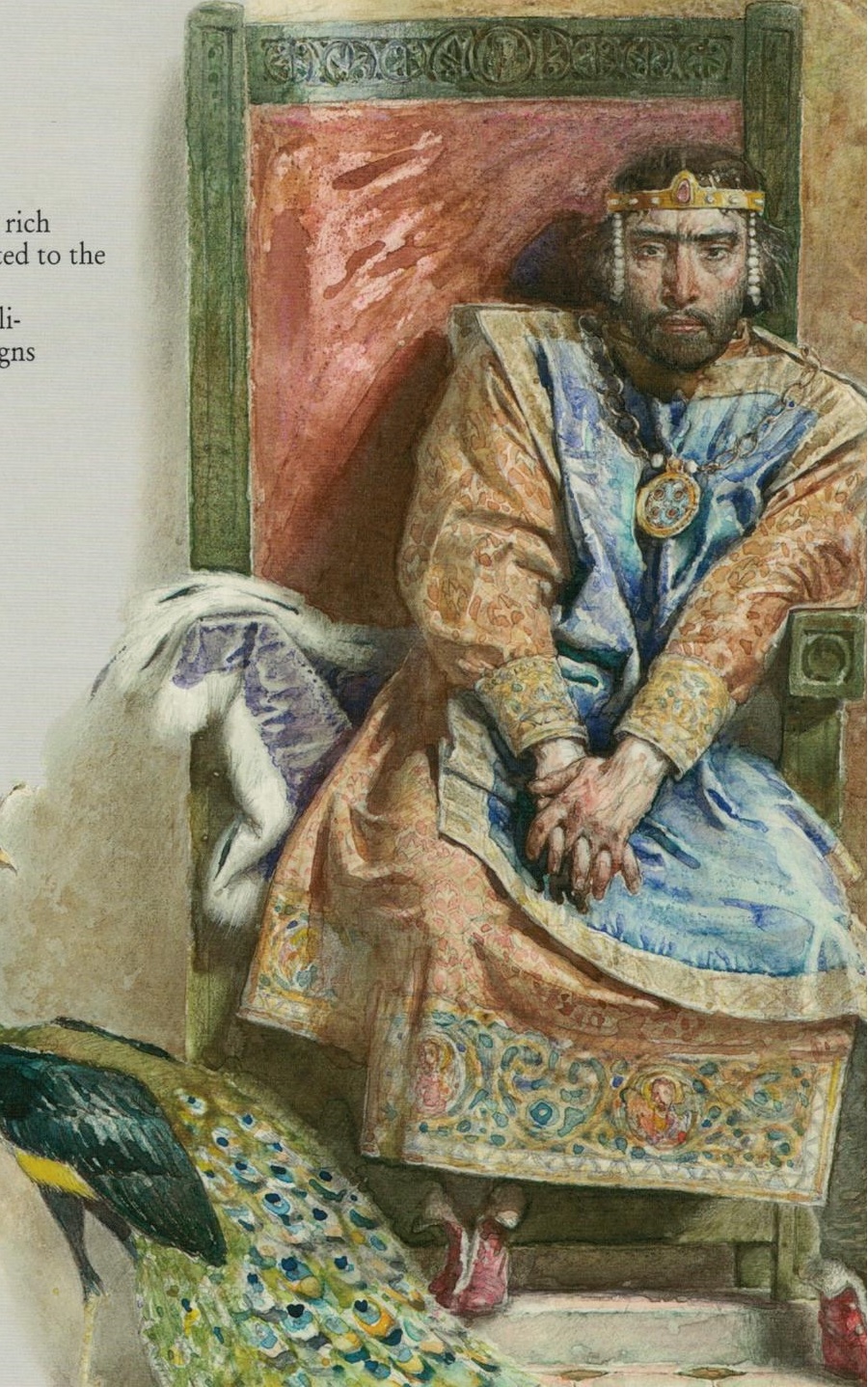 Emperor John I Tzimiskes, the murderer of his uncle Nikephorus II Phocas in his bed in the Boukoleon Palace. John married his uncle's wife, who was his co-conspirator in the assassination.
Emperor John I Tzimiskes, the murderer of his uncle Nikephorus II Phocas in his bed in the Boukoleon Palace. John married his uncle's wife, who was his co-conspirator in the assassination.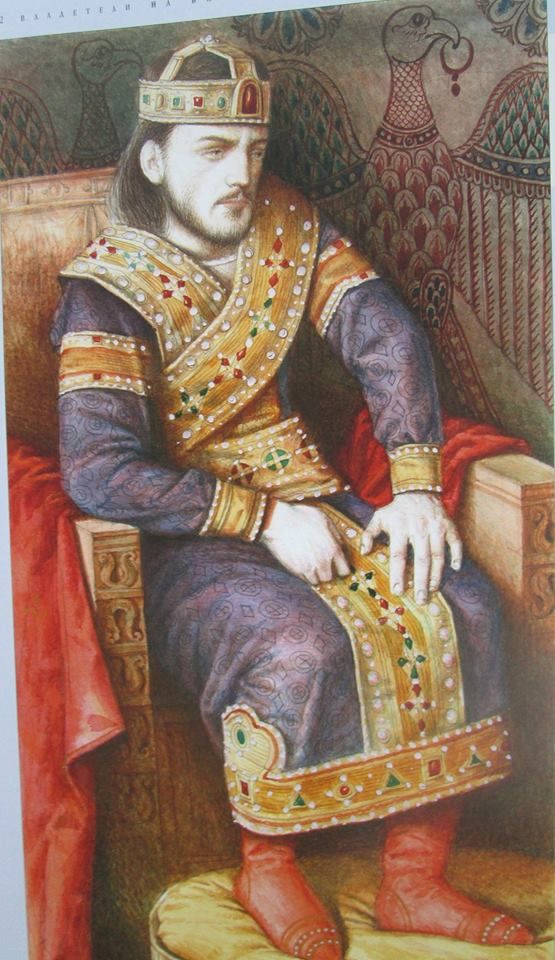
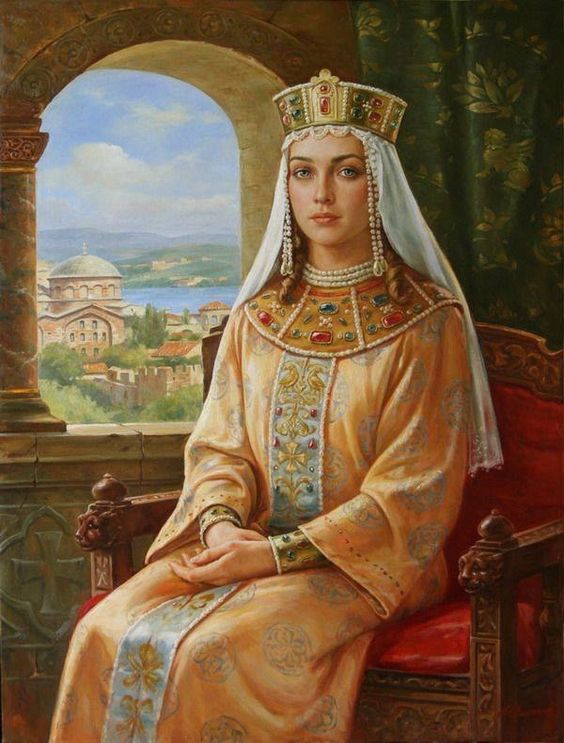
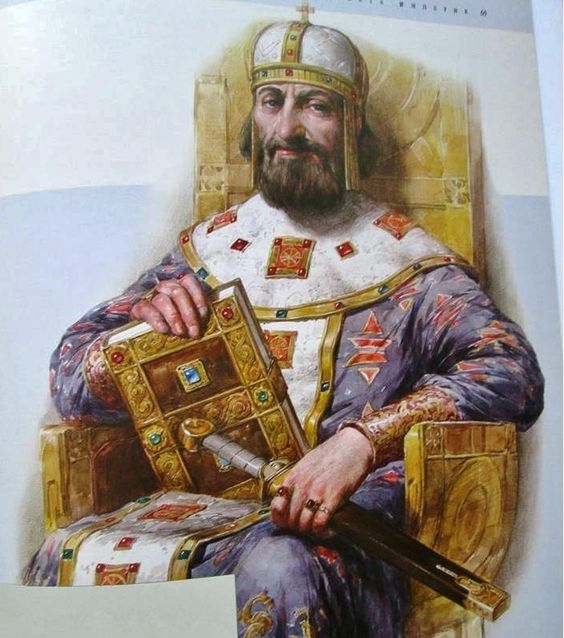
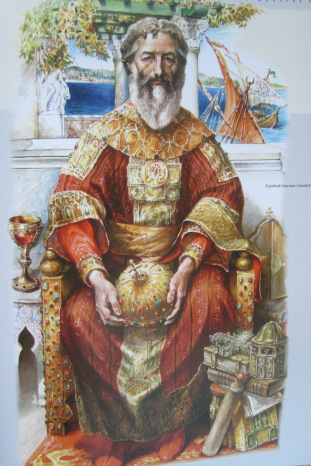

 The
The












